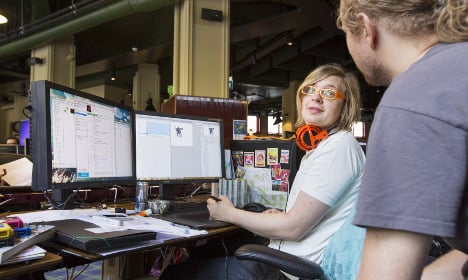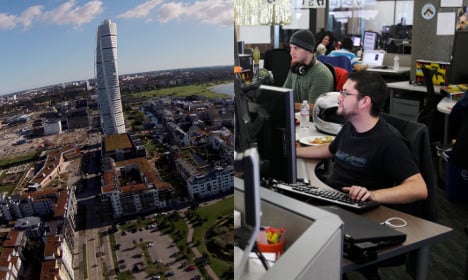The whole world is talking about innovation and its importance to future competitiveness, welfare and to the possibilities of solving future societal challenges.
Sweden's Prime Minister Stefan Löfven has created an innovation council, President Barack Obama talks about how the US must 'out-innovate' – be more creative than the rest of the world – and President Xi Jinping believes that innovation is key to the future of China.
A precondition for innovation is that a country or a region is able to attract competent people and that it cultivates and values the knowledge of those already living in the country. According to AnnaLee Saxenian, professor at the Berkeley School of Information, the success of Silicon Valley can to a great extent be attributed to its ability to attract people from emerging markets, such as India and China, and benefit from their expertise and contact with their home countries.
The Skåne region in southern Sweden and its biggest city, Malmö, is not that different from Silicon Valley: a greater part of the population is foreign-born than in the rest of the country – 36 percent in Silicon Valley compared to 19 percent in Skåne – and there are leading universities in the region.
But while Silicon Valley's diversity is seen as key to its success, Skåne battles social exclusion, segregation and high unemployment. Is that because Skåne has the “wrong” kind of immigration? Perhaps, but that's not the only reason. Even highly educated foreign-born graduates find it difficult to get on to the labour market and many Swedes returning from abroad feel that their overseas experience is neither valued nor wanted by Swedish employers.
THE LOCAL JOBS: Thousands of opportunities for English-speakers
According to the OECD the employment gap between well-educated native and foreign-born people is much bigger in Sweden than in other OECD countries.
Educated immigrants and former Swedish expats are often told that they are overqualified. Some managers seem to feel threatened by the fact that others are better educated or have more experience. Returning Swedes feel that their careers have been damaged by their absence from the Swedish labour market.
Every day people arrive in Sweden with exactly the degrees and competence needed to plug skills gaps in Sweden: welders, engineers, teachers and people with business degrees. Many of these new arrivals speak several languages and have relevant knowledge about and networks in future growth and export markets. They come here as refugees, students, labour migrants, returnees, or love refugees such as myself. But instead of giving them jobs and the opportunity to show what they are able to do, valuable time is wasted by discussing whether their degree meets Swedish standards.
Those who move to Sweden are forced to take – sometimes poor-quality – courses to learn Swedish and must often obtain a Swedish degree on top of the one they already bring, something that costs both the newcomer and Sweden time and money. Alternatively, they are screened out of hiring processes, perhaps not out of malice, but due to a narrow view of competence and simply because managers like to hire people similar to themselves. It feels safe and you know that they will fit in.
Many Swedish workplaces and environments are still very homogeneous, even though Sweden is more of an immigration country than the US if you look at the proportion of the population born abroad (around 16 percent in Sweden compared to 13 percent in the US).

Should Sweden help foreign-born workers? Photo: Melker Dahlstrand/imagebank.sweden.se
According to Statistics Sweden, the proportion of graduates among those who have moved to Sweden since the year 2000 is greater than the corresponding figure for those born there – and never before have so many well-educated individuals fled to Sweden than today. How do we ensure that these people's skills are utilized, to the benefit of Sweden as well as to the immigrants themselves? How do we ensure that their competence and motivation do not wither at centres for asylum seekers?
Expertise is a perishable commodity that languishes if it is not used. Important resources are wasted in the time it takes people to establish themselves on the Swedish labour market. Could Skåne take the lead and develop a vision of skills that would turn the region into the Silicon Valley of Europe?
Germany, which accepts the highest number of asylum seekers in the EU, uses so-called talent scouts who identify refugees with in-demand degrees and skills, and help connect them and employers. German newspaper Die Zeit call refugees “talents on standby” and although not all immigrants – or Swedes, for that matter – are talents as such, the attitude sees possibilities and potential rather than problems.
My British PhD supervisor at the London School of Economics called Sweden “the most civilized country in the world”. It is in many ways a good description. The problem is only that while Sweden is one of the most open, global and welcoming countries in the world, the jobs market is too closed-off and the view of competence too narrow to be able to make use of the skills of outsiders.
Innovation is about seeing opportunities long before anybody else does and new ideas often arise from meetings between people from different backgrounds (gender, education, ethnicity). The question is if Sweden is able to change its focus and transform today's “immigration problems” to the country's greatest resource for the future.
Integration expert Sylvia Schwaag Serger is head of international strategy for Sweden's innovation agency Vinnova. This is a translation of a debate article which first appeared in the Sydsvenskan newspaper.



 Please whitelist us to continue reading.
Please whitelist us to continue reading.